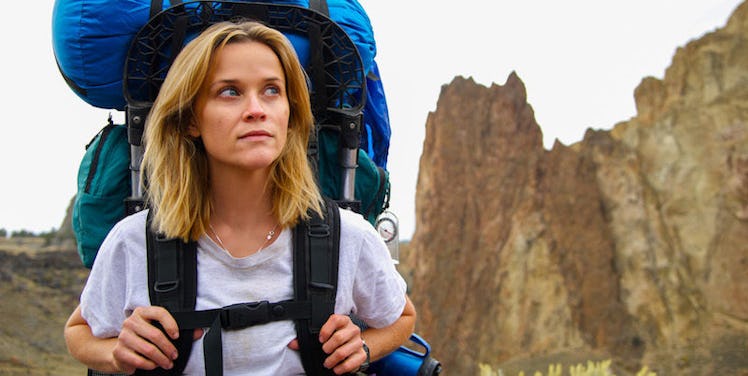
It's Time For The Film Industry To Stop Ignoring Strong Female Travelers
There are many troubling truths in American cinema – and cinema in general – today, such as racial bias and sexism. One genre where these restrictions or oversights seem to repeatedly reveal themselves is in adventure and travel films.
I don't mean films such as "Eat, Pray, Love," or "Under The Tuscan Sun." I mean films about women going out into nature and adventuring like badasses. Though heterosexual, romantic love may be present in these stories, it's not the focus or driving force of the films.
There have been travel and adventure films with female leads, such as "Wild," "Tracks," "Isabelle Eberhardt" and "Amelia." But for the most part, women are often left out of the realm of wanderlust and adventure: at least in a very real and autonomous capacity.
We see men in these roles constantly. "Indiana Jones," "The Motorcycle Diaries," "Into The Wild," "The Bucket List," "The Way," "The Secret Life Of Walter Mitty," "The Darjeeling Limited," "Easy Rider," "Everest" and "Life Of Pi" are just a few examples.
"Tracks" is one my favorite films of all time. I find so much inspiration in terms of casting away one's fears, throwing aside societal restraints and just going out there and exploring, discovering and changing. I'm a girl with a serious case of wanderlust. Whether it's foreign travel or just going for a short weekend backpacking trip to Oregon, travel and exploration are big parts of my everyday life.
There are quite a few books on this topic. In fact, some of the films I've mentioned were first books (like "Tracks" and "Wild"), but there are also books such as "Unsuitable For Ladies: An Anthology of Women Travellers" by Jane Robinson and "Women Travelers: A Century Of Trailblazing Adventures, 1850-1950" by Alexandra Lapierre. But these stories aren't being made into films, even though we know they are bankable.
"Wild," for example, grossed roughly $37 million domestically, and was largely lauded by film critics. Reese Witherspoon and Laura Dern both received Academy Award nominations for Best Actress and Best Supporting Actress, thanks to their performances in the film.
Another burning question I have is this: Where are the films about the women of color who are embarking on these amazing adventures? A quick Google search won't pull up too many non-white women who explored the world and were represented in film.
The obvious search results are Sacagawea and Pocahontas. But even then, white cis men played a huge role, both in their lives and in those films. I know that stories of women of color exist. Where are they?
There is a slew of problems with some female-lead travel films. Take "Isabelle Eberhardt," for example. The book and its consequent film are about the real-life Swiss explorer who dressed like a man, traveled to North Africa and converted to Islam. It's an amazing life, to be sure. But again, we see a white woman's story at the forefront here.
A lot of complications arise from these films. While it's true that some of the explorers in these stories – like is the case with "Tracks" – do begin to appreciate the indigenous cultures around them, and they do eventually become a big part of the narrative, the themes of colonialism and neocolonialism are still abound in these narratives.
National Geographic recently named their Adventurer Of The Year. She is a 31-year-old mountaineer (and an all-around fantastic human being) named Pasang Lhamu Sherpa Akita, who grew up in Lukla, Nepal. By the time she was 15, she had lost both of her parents, and was left to care for her 6-year-old sister.
Still, she made her way up the world's tallest peaks (K2 and Everest, to name a few) and has continued to work tirelessly to serve the disadvantaged in the aftermath of the April 2015 earthquake in Nepal. I want to see this woman portrayed on the big screen.
Or what about Zora Neale Hurston of "Their Eyes Were Watching God" fame? Not only was Hurston a talented and accomplished author, but she was also a well-known anthropologist who frequently traveled to the Caribbean and American South. She "immersed herself in local cultural practices to conduct her anthropological research."
I want to hear about these kinds of women more: their lives and their travels. I want to buy a ticket in order to sit and watch their lives and adventures.
Taking into account our current cultural climate surrounding women's rights and racism today, we so desperately need to see these stories of women of every race and orientation represented in cinema. It doesn't matter whether they're based on true stories or fictional accounts: They are incredibly essential to the fabric of an equal and just society.
The media is a mirror of and a window to our world, so representation is absolutely necessary. Women are more than love interests, damsels in distress and catalysts for a man's journey to self-realization. We too want to be Indiana Jones. We also (although this may sound a tad privileged and bourgeois) experience ennui and seek healing through travel and exploration, like Chris McCandless.
We also face enormous hardship and personal loss, and our travels are not necessarily beach holidays prompted by our own volition. Sometimes, we are like Leonardo DiCaprio's character of Hugh Glass in "The Revenant," and we are forced to traverse the wild in order to survive.
Not all travelers are male, and not all travelers are white. It's time the film industry reflected that truth.